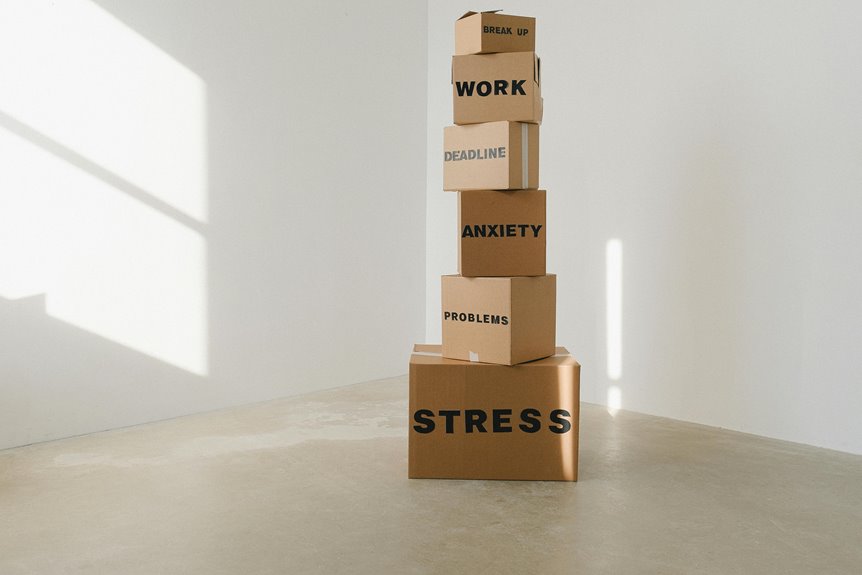When you’re facing tight deadlines and mounting pressure, it’s easy to feel overwhelmed. You might find yourself struggling to stay productive and maintain your mental well-being. However, developing effective coping mechanisms can make a significant difference. By understanding your stressors and implementing strategies like prioritization and mindfulness, you can navigate these challenges more effectively. But what specific techniques can you adopt to truly transform your approach to stress?
Table of Contents
Key Takeaways
- Identify and acknowledge stressors, such as tight deadlines or unrealistic expectations, to develop effective coping strategies.
- Utilize prioritization techniques like the Eisenhower Matrix to manage tasks by urgency and importance efficiently.
- Build a support network by communicating openly with colleagues, mentors, and friends for collaboration and assistance during high-pressure situations.
- Incorporate mindfulness practices, such as deep breathing or meditation, to maintain focus and reduce anxiety when facing deadlines.
- Reflect on past projects to identify effective strategies and improve time management and collaboration for future deadlines.
Understanding the Sources of Stress
When you face tight deadlines, understanding the sources of stress can help you manage your anxiety more effectively. Often, you might feel overwhelmed by the sheer volume of work or the fear of failure. These feelings can stem from unrealistic expectations you set for yourself or external pressures from colleagues and supervisors.
Recognizing these stressors is the first step toward addressing them. It’s also essential to identify how your environment contributes to your stress. For example, distractions or lack of resources can heighten your anxiety levels.
Prioritizing Tasks Effectively
Recognizing your stressors is just the beginning; the next step is figuring out how to tackle your tasks effectively.
Start by listing everything you need to do, then categorize tasks by urgency and importance. Focus on high-priority items that have imminent deadlines or significant consequences.
List your tasks, categorize them by urgency and importance, and prioritize those with imminent deadlines for effective stress management.
Don’t be afraid to delegate or ask for help on less critical tasks. Use a simple system, like labeling tasks as ‘urgent,’ ‘important,’ or ‘can wait.’ This clarity helps you decide what deserves your immediate attention.
Finally, review your list regularly to adjust priorities as needed. By breaking down your workload and prioritizing effectively, you’ll not only reduce stress but also enhance your productivity, making tight deadlines feel more manageable.
Time Management Techniques
When you’re facing tight deadlines, mastering time management techniques can make a big difference.
By using prioritization strategies and effective scheduling methods, you can tackle your tasks more efficiently.
Let’s explore how these tools can help you stay on track and reduce stress.
Prioritization Strategies
Effective prioritization strategies can make all the difference in managing tight deadlines, especially when you’re juggling multiple tasks. Start by identifying urgent versus important tasks; this helps you focus on what truly matters.
Utilize the Eisenhower Matrix to categorize your tasks: divide them into four quadrants based on urgency and importance. Next, set clear goals for each day, allowing you to tackle high-priority items first.
Don’t hesitate to delegate tasks when possible, freeing up your time for more critical work. Finally, review your progress regularly to adjust priorities as needed.
Effective Scheduling Methods
Prioritization sets the foundation, but without a solid scheduling method, even the best-laid plans can fall apart. Start by breaking your tasks into smaller, manageable chunks.
Use techniques like the Pomodoro Technique, where you work for 25 minutes and take a 5-minute break. This boosts focus and reduces burnout.
Next, consider time blocking; dedicate specific chunks of your day to different tasks. This helps maintain a clear structure and keeps distractions at bay.
Don’t forget to set deadlines for each task, even if they’re self-imposed. This creates a sense of urgency.
Finally, regularly review and adjust your schedule. Flexibility is key, and adapting your plan guarantees you stay on track while managing stress effectively.
Building a Support Network
When you’re facing tight deadlines, building a support network can make all the difference.
Start by identifying key individuals who can offer help or advice, and make sure to establish open communication channels with them.
This way, you’ll have a solid foundation to rely on when the pressure mounts.
Identifying Key Support Individuals
Building a support network can greatly ease the stress of tight deadlines, especially when you identify key individuals who can help.
Start by considering your colleagues—who do you trust to provide guidance or share the workload? Look for mentors who’ve navigated similar pressures; their insights can be invaluable.
Don’t forget about friends or family; sometimes, a listening ear or emotional support can make all the difference.
Additionally, think about forming study or work groups; collaborating with others can spark new ideas and solutions.
By surrounding yourself with the right people, you can lighten your load and tackle challenges more effectively.
Establishing Open Communication Channels
To effectively manage stress during tight deadlines, establishing open communication channels is essential. You should feel comfortable reaching out to your support network, whether it’s colleagues, supervisors, or friends.
Share your workload concerns and seek feedback; this not only lightens your burden but also fosters collaboration. Regular check-ins can clarify expectations and reduce misunderstandings.
Encourage open dialogue by creating an environment where everyone feels valued. When people express their concerns, you’ll build trust and encourage teamwork.
Don’t hesitate to ask for help when needed—it’s a sign of strength, not weakness. By maintaining these open lines of communication, you’ll create a supportive atmosphere that helps you navigate tight deadlines with greater ease and confidence.
Practicing Mindfulness and Relaxation
While tight deadlines can feel overwhelming, practicing mindfulness and relaxation techniques can help you regain focus and calm.
By incorporating these strategies into your routine, you’ll find it easier to handle pressure and stay productive. Here are three effective techniques you can try:
- Deep Breathing: Take a few moments to breathe deeply. Inhale slowly through your nose, hold for a few seconds, then exhale through your mouth. This can reduce anxiety and increase clarity.
- Guided Meditation: Use apps or online resources for short guided meditations. Even five minutes can help you reset your mind.
- Progressive Muscle Relaxation: Tense and relax each muscle group, starting from your toes and moving up to your head. This can release physical tension and enhance your focus.
Maintaining a Healthy Lifestyle
Mindfulness and relaxation techniques can set the stage for a holistic approach to managing tight deadlines, but maintaining a healthy lifestyle is equally important. A balanced diet, regular exercise, and adequate sleep boost your physical and mental stamina, helping you tackle pressures more effectively.
Here’s a quick reference table to prioritize your well-being:
| Healthy Habit | Benefits |
|---|---|
| Balanced Diet | Increases energy and focus |
| Regular Exercise | Reduces stress and improves mood |
| Adequate Sleep | Enhances cognitive function |
| Hydration | Maintains energy levels |
| Social Connections | Provides emotional support |
Embracing Flexibility and Adaptability
As deadlines loom, embracing flexibility and adaptability can turn potential stress into manageable challenges.
When you stay open to change, you’ll find new solutions and approaches that can ease your workload.
Here are three strategies to help you embrace this mindset:
- Prioritize Tasks: Recognize what’s urgent and important, and tackle those tasks first. This helps you allocate your time effectively.
- Stay Open to Feedback: Be willing to adjust your plans based on input from others. Collaboration often leads to better outcomes.
- Practice Mindfulness: Take short breaks to clear your mind. This can enhance your focus and allow you to adapt to evolving situations more easily.
Learning From Past Experiences
Reflecting on past experiences can provide invaluable insights that help you navigate tight deadlines more effectively.
Think back to previous projects: what worked well and what didn’t? Identify patterns in your approach, whether it was time management, team collaboration, or stress levels. By recognizing these factors, you can make better decisions moving forward.
When you encounter similar pressures, apply the lessons learned. Maybe you discovered a particular time of day when you’re most productive, or perhaps certain tasks can be delegated.
Keep a journal to track these insights; it’ll serve as a helpful reference during high-pressure situations. Ultimately, using your experiences as a guide will empower you to handle deadlines with greater confidence and efficiency, reducing stress in the process.
Frequently Asked Questions
How Can I Stay Motivated During Tight Deadlines?
To stay motivated during tight deadlines, break tasks into smaller steps, set achievable goals, and celebrate small wins. Keep your workspace organized, eliminate distractions, and remind yourself of your purpose to maintain focus and energy.
What Are Quick Stress Relief Techniques I Can Use?
You can try deep breathing exercises, take short walks, or practice mindfulness for quick stress relief. Listening to music or stretching can also help you relax and regain focus when you feel overwhelmed.
How Do I Handle Unexpected Changes in Deadlines?
When you face unexpected changes in deadlines, stay flexible and reassess your priorities. Communicate with your team, break tasks into manageable parts, and focus on what you can control to maintain productivity and reduce stress.
What Should I Do if I Feel Overwhelmed?
When you feel overwhelmed, take a moment to breathe deeply. Break tasks into smaller steps, prioritize what’s urgent, and don’t hesitate to ask for help. Remember, it’s okay to take breaks and recharge.
Can I Use Technology to Manage My Stress Better?
Yes, you can definitely use technology to manage stress better. Apps for meditation, task management, and relaxation techniques can help you stay organized and focused, reducing feelings of overwhelm while enhancing your overall well-being.




